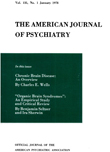THE OUTCOME OF SCHOOL PHOBIA: A FOLLOW-UP STUDY BASED ON 41 CASES
Abstract
A clinical study of 41 cases of school phobia confirmed the hypothesis that this syndrome is a variant of separation anxiety; the basic issue proved to be leaving home, not going to school. The outcome of these cases after a mean period of 3 years confirmed the utility of a treatment program of brief psychotherapy centered about prompt return to school. Therapeutic success was shown to vary inversely with the age of the child and the severity of his psychopathology.
School phobia constitutes a symptom complex which may be a manifestation of a readily reversible situational reaction or of a severely neurotic or even psychotic adjustment. Effective treatment should be based on a careful diagnostic formulation. But, with the sole exception of the overtly psychotic child, the central focus of the treatment program for all cases should be placed upon firm insistence on early return to school, reinforced by appropriate sanctions of authority.
Access content
To read the fulltext, please use one of the options below to sign in or purchase access.- Personal login
- Institutional Login
- Sign in via OpenAthens
- Register for access
-
Please login/register if you wish to pair your device and check access availability.
Not a subscriber?
PsychiatryOnline subscription options offer access to the DSM-5 library, books, journals, CME, and patient resources. This all-in-one virtual library provides psychiatrists and mental health professionals with key resources for diagnosis, treatment, research, and professional development.
Need more help? PsychiatryOnline Customer Service may be reached by emailing [email protected] or by calling 800-368-5777 (in the U.S.) or 703-907-7322 (outside the U.S.).



